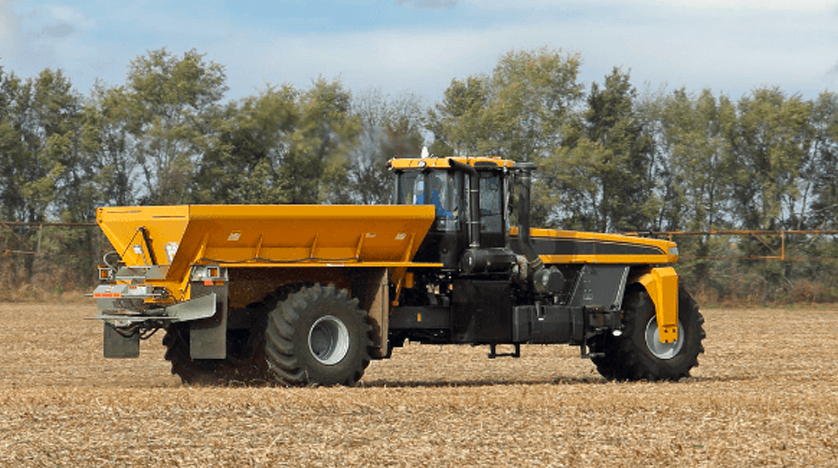
Posted April 4, 2017
Category(s) Braen Stone News Industry News

For centuries, the natural stone product of agricultural lime has been used to improve growing conditions for farm fields, gardens and even residential lawns. While liming is extremely common in the agricultural sector, there are different options to consideration. One of the most common limes compared to aglime is dolomitic lime.
These all-natural stone products have proven themselves to be to be invaluable to the agricultural industry, as well as in residential applications throughout the centuries. Nevertheless, even though both materials have been around for a long time, there is still a lot of confusion about which should be used for what purposes and when.
Discussing the difference between the two is important so that you can figure out which is right for your needs. Utilizing the wrong product could lessen the impact of the lime on your soil. To avoid making any mistakes, take a look at this breakdown of both standard agricultural lime and dolomitic lime.
Before you can even begin to think about whether agricultural lime or dolomite could benefit your soil, you first need to have an understanding of when these materials are actually necessary.
Aglime and dolomite both become useful when soil becomes too acidic. This typically occurs after exposure to acid rain, after frequent use of fertilizers and other chemicals or even after the soil has simply become deprived of important nutrients from years of planting and harvesting crops.
Additionally, because lime and dolomite are alkaline, they help to raise the soil’s pH back to a level that is conducive to growing plants. Regardless of whether or not you suspect that your soil may be too acidic, it’s always a good idea to have a sample of the dirt tested on an annual basis.
For larger, commercial fields, it’s generally advisable to send a sample off to a professional testing company for a readout. Homeowners however can usually get away with purchasing a home testing kit. Once you’ve concluded that your soil’s pH needs to be elevated, you should start considering the right solution for your needs.
Often referred to as “aglime“, agricultural lime is simply limestone that has been pulverized down to a fine particle size and introduced to acidic soil. Lime is selected because it contains such a high amount of calcium, which works to neutralize the soil’s pH levels.
In addition to this, agricultural lime is also able to increase the ability of vegetation to absorb essential nutrients from the ground. Typically, aglime is spread in its pure, dry “calcitic” form, meaning that the product is comprised mainly of calcium carbonate.
At the same time, you may also find some other variations of agricultural lime. Liquid lime, for example, is applied using a combination of approximately 50% dry aglime and 50% water.
The first obvious benefit to using agricultural lime is that it has been proven time and again to effectively balance out soil pH levels and improve plant health. Soil that has become to acidic as the result of frequent crop cycles or acid rain makes it difficult for nutrients to be absorbed through a plant’s root system or even for water to fully penetrate the earth.
When soil is neutralized, these problems are eliminated and vegetation can thrive. Lime also stimulates the growth and increases activity of micro-organisms in the soil that can assist with growing conditions. Another great thing about aglime is that, when properly tilled into the soil, additional applications of the material will not need to be spread very frequently.
The effects of the material will be long lasting. And although it does take some time for aglime to completely work its magic, measurable results can be detected quickly in soils that are suffering from excessively low pH levels. Liquid lime does tend to work more quickly than dry lime, but there are some considerations to be made when using this type of product.
As mentioned previously, a little bit of patience is required when waiting for agricultural lime to fully correct your soil. Although some positive results may be observed, it will likely take a full year before the desired pH levels have been restored.
Because of this, it’s very important to make plans to spread aglime across affected areas in advance. The best time to till aglime into the soil is at the end of the growing season. This will give the material enough time to be absorbed into the soil and react before the following planting season. Because dry lime is so small in particle size, it can be blown in the wind, so it should be applied in calm weather conditions.
It should also be noted that agricultural lime reacts more quickly with water. If your soil is particularly dry, it may take more time for you to achieve the desired results. It’s for this reason that many people turn to liquid lime.
While liquid lime will react faster and can be more evenly spread, however, it is also more labor intensive and liquid lime will need to be applied more frequently than dry lime.
As the name suggests, dolomitic lime is manufactured by crushing dolomitic limestone down to very small pieces. As with agricultural lime, dolomitic lime works to increase the pH levels of acidic soil and return the earth to nearly neutral.
The primary difference between the two materials is that, in addition to containing calcium carbonate, dolomitic lime also contains a mixture of magnesium carbonate. Typically, the mineral is comprised of approximately 50% calcium carbonate and 40% magnesium carbonate with the remainder being other materials.
Because both calcium carbonate and magnesium carbonate are basic, the idea is that both can work together to improve soil conditions while also introducing valuable nutrients into the earth that are essential to plants.
Although both agricultural lime and dolomitic lime are able to successfully raise the pH levels of acidic soil, dolomitic lime is generally chosen for pastures that have a history of grass tetany to raise forage magnesium levels or in fields, gardens and lawns where the soil is particularly magnesium deficient.
Soil is considered to be magnesium deficient when there is at least a 6:1 calcium to magnesium ratio, meaning that there is approximately 30%-40% more calcium content. When this is the case, dolomitic lime can quickly restore the mineral balance in the earth. Yet another great thing about dolomitic lime is that it is quite inexpensive and easy to come by.
It’s important to keep in mind that, as stated above, dolomitic lime is really intended only for soil that has a magnesium deficiency. As a general rule of thumb, soil should always have a calcium to magnesium ratio of between 7:1 (for sandier soils) and 10:1 (for more clay-based soils).
Beyond this, the introduction of dolomitic soil (which contains a 2:1 magnesium to calcium ratio) can actually cause more problems to the earth than what it’s worth. Excessively high magnesium levels have been known to create issues with soil compaction, the introduction of a high volume of weeds, and increased difficulty in water properly being absorbed into the ground and into the plants.
To avoid disaster, you should always carefully measure your soil’s magnesium levels before selecting dolomitic lime.
If both agricultural lime and dolomitic lime are capable of raising the soil’s pH level from acidic to nearly neutral, which option is best for your needs? Fortunately, coming to the right answer is not as difficult as you might imagine. First, you’ll need to know what type of soil you’re working with.
Soil typically has a sandy, loamy or clay texture. If you’re not certain about which category your soil falls under, you should consider consulting with an expert. With this information in mind, you are now equipped to determine what the ideal calcium to magnesium ratio is for your land.
Next, you’ll need to conduct a test to determine both the pH level of your soil, as well as the mineral content. If the magnesium level falls below the ideal ratio, or is less than 75 ppm, you will want to consider choosing dolomitic lime over agricultural lime. It should be noted that this is usually quite a rare occurrence.
In most cases, traditional aglime will suffice to meet your needs. If you’re in need of very fast results and have a small coverage area or don’t mind more frequent liming applications, think about working with liquid lime.
For long term results that will require fewer applications, dry aglime will do the trick. Regardless of what liming materials you choose to use, though, it’s important that you always follow manufacture specifications regarding how much should be spread and how it should be tilled into the soil.
Applying too much or too little lime could create further problems, and failure to work the material into the earth could significantly reduce lime efficiency.
Once you’ve decided which type of lime is right for your needs, you’ll want to make sure that you’re buying your materials from a reliable supplier. Braen is one the largest suppliers of aglime throughout NJ and NY. We sell only the highest quality liming agents at competitive wholesale pricing.
Our team of experts is happy to answer any questions that you may have throughout the selection process so that you can rest assured that you’ve made the best purchasing decision. Our liming products are available for pickup or bulk delivery to your location.
Although our primary delivery area includes Bergen County, Morris County, Passaic County, Essex County and Sussex County, we can also work with those who need deliveries throughout all of NJ, NY, NYC and PA.
VIBRATION CONCERNS SUPPORT NUMBER
973-720-7094
Thank you! Your form was submitted successfully.
There has been an error submitting your form.